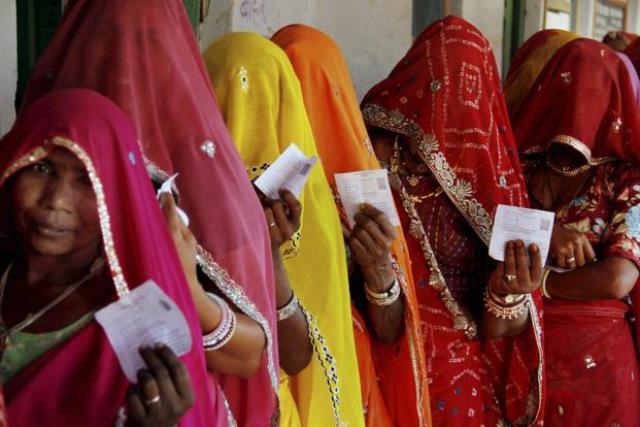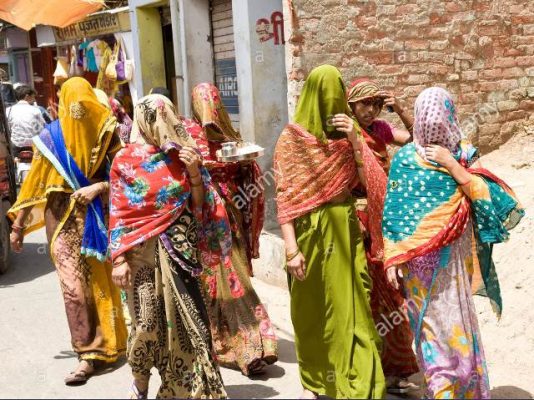By Abdul Rashid Agwan
An editorial of Samana, the mouthpiece of a major Indian political party Shiv Sena, had appeared on 1st May amidst the ongoing general elections in the country, which poked the central government for taking steps against veiling in India on the line of Sri Lanka. The lead page titled “A question to Prime Minister Modi: It happened in Rawana’s Lanka, when it will be in Rama’s Ayodhya?” has kicked off a political controversy, perhaps with the aim to encash the situation in a neighboring country for polarizing voters in India.
It is yet not evident, what the concerned editorial of Samana meant by “Burqa ban”? Is it an opposition to the attire itself or covering of the face, or a demand for some austere security check of a veiled person? In fact, these are three different things in themselves but the media and radical Hindu leaders prefer ambiguity in their own best interests. In the name of ‘national security’, they have grabbed an opportunity to malign Islam and Muslims for another time.
Spokesperson of Shiv Sena Neelam Gorhe remarked a few hours after the publication of the controversial editorial that the views expressed in the publication “may be a personal opinion of the editor.” Yet, many entailing news stories gave the impression that it was a demand of the party. The PM and his party did not respond and Shiva Sena has apparently distanced itself from the ungainly demand. Perhaps, it was instantly realized that pursuing the matter may polarize voters more against the prospects of the so-called Hindutva parties during the last leg of the present elections than for their advantage. It is one of some recent regrets by the party over its Samana editorials including the one that likened Mumbai’s Gujaratis as “call girls”.

The current wave of onslaught against Hijab has roots in the Islamobhobia fomented in Europe by certain Fascist and Nazi sections there, which lead to legislation in some countries against this Islamic practice. An appeal to a UN body on such coercion led to international embarrassment for France. In two landmark decisions in October 2018, the United Nations Human Rights Committee found that France violated the human rights by fining women for wearing the niqab, a full-body Islamic veil.
Since the name of Rama and his Ayodhya have been invoked by Samana for justifying the ban, it is interesting to note here that ladies of Rama’s Ayodhya were practicing veiling. Ignoring the contemporary image of ‘modern’ Sita created by cinema and TV soaps, her image in the eyes Valmiki was quite the opposite. Anjani Kant writes in her book Women and the Law under the section Purda, “Another aspect of women’s life in the Ramayana is the prevalence of a mild form of purda.” She quotes the Ramayana (II.33.8) wherein Sage Valmiki laments on the banishment of Sita, saying, “A lady, who had so far not been seen even by the spirits of the sky, should now become an object of public gaze.” The Ramayana (II.114) only permits unveiling by a noble woman in case of such emergencies as war, sacrificial ritual and marriage. In many Rama stories his younger brother Lakshamana is often quoted to have said, “I have never looked at Mother Sita all my life.” Even, the ladies of Rawana’s Lanka practiced purda, as underlined by the Ramayana (II.111). Mandodari, the wife of Rawana, regrets to Rama when she came out of the walled city for mourning her husband’s death that she was not in a state to properly cover herself.
Though RSS has been ceaselessly propagating the idea that the practice of purda among Hindus began in India during the Muslim period only, it is nothing but the denial of facts of historic culture vogue in the subcontinent. The Sanskrit word used by the Ramayana for veiling is Avagunthana, which has prevalence in both the classical and modern literature. For instance, Bhasa’s Sanskrit drama perhaps written in the fourth century CE, Pratima Natakam, depicts the ladies of the palace of Dasharatha to generally covering their bodies (Avagunthana), when they happened to come out in public. One of the famous stories of Ravindranath Tagore has the title ‘Avagunthana’ and the word is used in many poems of Harvansh Ray Bachchan.
Therefore, it may be rightly assumed that it is sheer opportunism and hypocrisy behind the Burqa ban demand, voiced by the Samana and immediately joined by the chorus of Islamophobes in the country. From international standards it is an invitation to violation of human rights and it is also a sort of mismatch with the Hindutva ideology itself.



good article!